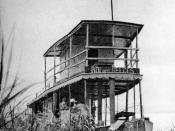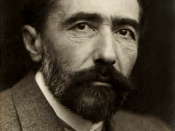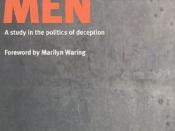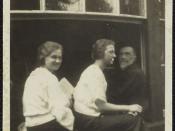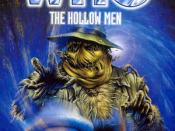The poem by T.S. Elliot, The Hollow Men and The Heart of Darkness by Joseph Conrad embody apathy and indifference. Both ConradÃÂs Station Manager and ElliotÃÂs hollow men present a profound intellectual and emotional lack of interest or concern as well as being devoid of distinguishable humanity. The two texts highlight the grave characteristics of both the station manger and the hollow men by embellishing the details of their vacant eyes as well as ÃÂdeathÃÂs other kingdom,ÃÂ of which they both inhabit, their indefinite characteristics and their hollowness.
The station manager is every man in that none of his features stand out from the norm. In the fact that he is generic in every way, he embodies the benign face of evil. His inherent ambiguities such as his ÃÂsmile ÃÂ not a smile,ÃÂ as well as making ÃÂthe commonest phrase appear absolutely inscrutable,ÃÂ incapable of being investigated, analysed, or scrutinized.
It is clear that his only absolute is ambiguity as Marlow goes on to describe him with paradoxes, ÃÂHe originated nothingÃÂ but he was great,ÃÂ and ÃÂhe was neither civil nor uncivil.ÃÂ In a similar fashion the hollow men ÃÂare quiet and meaningless,ÃÂ embodying ÃÂshape without form, shade without colour, paralysed force,ÃÂ and ÃÂgesture without motion.ÃÂ Neither portrayal of either character has any distinguishable traits of humanity, indifferent to everyone and anyone.
The hollowness of both characters typifies their lack of humanity, containing neither heart nor soul, which are commonly associated with humanity. Marlow considers whether ÃÂthere was nothing within him (the station manger),ÃÂ and notes that his smile had been ÃÂa door opening into a darkness he had in his keeping.ÃÂ It is also the station managerÃÂs belief that ÃÂmen who come out here should have no entrails,ÃÂ further evidence of his emptiness. The men in T.S. ElliotÃÂs poem ÃÂare the hollow menÃÂ the stuffed menÃÂ headpiece filled with straw.ÃÂ In the same way that the station manager is evidenced as having no human entrails, the hollow men have equally unhuman characteristics.
The eyes of both the hollow men and the station manager are both vacant and void of humanity. The station managerÃÂs eyes of the usual blue were perhaps remarkably cold, and he certainly could make his glance fall on one as trenchant and heavy as an axe,ÃÂ evidence of his lack of humanity, evidenced also when ÃÂhe inspired uneasiness.ÃÂ With such cold and vacant eyes the station manager id devoid of emotional or intellectual interest, instead presenting meaningless transparency. The hollow men have no eyes at all, ÃÂthere are not eyes here, and there are no eyes here.ÃÂ The hollow men are ÃÂsightless, unless the eyes reappear as the perpetual star,ÃÂ to guide them and give them meaning and purpose, of which neither the hollow men nor the station manager possess.
The landscapes in which both the hollow men and the station manager live are both void of any meaning or life themselves. Where the hollow men reside ÃÂis the dead land, this (the land which they reside) is the cactus land, here the stone images are raised, here they receive the supplication of a dead manÃÂs hand under the twinkle of a fading star.ÃÂ The hollow men are in a vacuum which acts as a catalyst for their meaningless and inhuman existence. The station manager lives ÃÂin a city of the dead,ÃÂ whereby one thought ÃÂinstead of going to the centre of a continent, {they} were about to set off for the centre of the Earth,ÃÂ ÃÂone of the dark places of the earth,ÃÂ which also acts to subvert any meaning or apathy that may have existed in the station manager.
Both the hollow men and the station manager are defined by a profound absence of intellect, learning, initiative, respect, love, fear, insides and meaning. As a result of such severe omissions to the character, they are lacking in humanity, instead embodying stoicism and indifference.
Bibliography:http://en.wikipedia.org/wiki/T._S._Eliot
